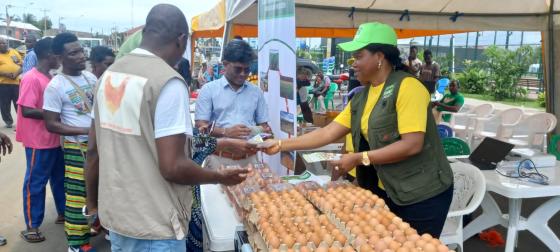Liberia: “Those Who Import Poultry Products Don’t Consume Them”

A poultry farmer, Joyce Q. Pajibo showcases organic poultry products during the program.
.... Farmers outline constraints and call for more investment
Raising poultry can be an important source of revenues for small-scale farmers in Liberia, but farmers in the sector have said poultry production in the country is still laden with many constraints.
Some of the constraints the poultry farmers have outlined include the lack of feed, high cost price of medicines, lack of farm equipment, lack of access to loans.
The farmers also revealed that many of the poultry products imported into the country are not consumed by the suppliers or importers. “Those who import poultry products in Liberia do not consume them. They prefer buying the ones produced locally,” the Liberian poultry farmers have amazingly revealed.
They said the situation is an indication for the government to prioritize local poultry production in order to improve nutrition, create better incomes for farmers and to create more jobs for women and youths.
The poultry farmers raised the concerns on October 27 in Monrovia during their second anniversary. The program, which was organized by the Poultry Farmers Association of Liberia (POFAL), was attended by representatives from the Ministry of Agriculture, the Food and Agriculture Organization (FAO), BRAC Liberia, faculty and students of the United Methodist University and the poultry farmers.
The celebration was intended for the farmers to raise awareness about the importance of the poultry sector, as well as showcase some of their products.
j
The Minister of Agriculture, Jeanine Milly Cooper, was represented at the program by the Agricultural Economist at the Ministry, Francis Mwah, who said that the Ministry is aware about the challenges facing the poultry sector and is doing all it can to ensure the relevant support toward the sector.
According to him, the Ministry has introduced a new project, the “Rural Economic Transformation Project” (RETRAP), which will assist farmers in the livestock sub sector.
RETRAP, a World Bank supported project of the MoA, seeks to assist 60,000 beneficiaries in the swine and poultry sectors, as well as cassava, rubber and vegetable value chains, for commercial viability.
Mwah said that under the project, poultry farmers have the opportunity to access grants to improve production.
“We are calling on your members to take advantage of the grant program at the Ministry. This program is designed to enable those of you in the poultry sector and other value chains to commercialize,” he told the farmers.
Mwah said that to make the poultry sector become viable, it will also require that poultry farmers take ownership of the sector to supply the market.
“We have good soil, but those who are growing corn are doing this to solve the issue of feed. We did well before in the poultry sector and let us do it again but let us not do it the Liberian way. The Ministry is willing to do much to support the sector,” he explained.
Also speaking, the Country Director of the Food and Agriculture Organization (FAO), Mariatou Njie, said that FAO remains committed to the support and development of the poultry sector.
“I strongly believe an anniversary is not an event but a golden opportunity to take stock and reflect on challenges and progress made and constructively engage for a bigger result. Though largely undeveloped, the poultry sub sector has huge potential for wealth creation and employment opportunities in Liberia,” she said.
She said that FAO has supported a number of interventions through technical support and project interventions. Another one that is underway is the TCP on livestock, under which a sub component will focus on poultry.
Njie said that to solve the issue of poultry feed, farmers will need the education to have them produce maize for feed.
“We have supported farmers to produce more maize for the market to be used as feed but most of the people are growing the crops only for the consumption. This will need education if we are to solve the problem of feed,” she said.
For her part, the President of the Farmers Union of Liberia, Josephine Francis, said that there is a need for a policy to drive the poultry sector forward.
Francis said that it was sad that the country still imports a lot of poultry products which are, in fact, not healthy for consumption.
She called on the government to make sure that poultry farmers in the country are given all of the attention to supply the market.
